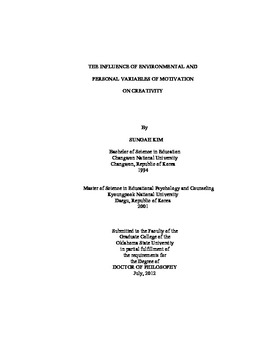| dc.contributor.advisor | Cho, YoonJung | |
| dc.contributor.advisor | Montgomery, Diane | |
| dc.contributor.author | Kim, Sungah | |
| dc.date.accessioned | 2013-11-26T08:33:22Z | |
| dc.date.available | 2013-11-26T08:33:22Z | |
| dc.date.issued | 2012-07 | |
| dc.identifier.uri | https://hdl.handle.net/11244/7236 | |
| dc.description.abstract | Scope and Method of Study: Cultivating creativity is considered as a prominent curricular goal for the preparation for the future which might have more new information and technology and more challenge. Creative ideation reflects how individual uses appreciate ideas, and it can be a universal component of creativity, in that creativity at all levels involves ideation (Runco, Plucker, & Lim, 2001). The most efficient way to cultivate people's ideation is motivating them to be creative in their everyday life as well as in specific context. It is crucial to explore what motivational theory or variables can explain ideational behaviors and improve them. Achievement goal orientation theory focus on the types of goal individuals pursue in achievement situations (Dweck & Leggett, 1988; Maehr, 1989; Urdan & Midgley, 2003). Different goals results in different behaviors (Urdan & Midgley, 2003). Individual need for autonomy is related to achievement motivation (Grolnick, 2002; Grolnick, Deci, & Ryan, 1981; 1997). Autonomy-supportive contexts are associated with more intrinsic motivation (Deci, Schwartz, Sheinman, & Ryan, 1981). The purpose of this study was to investigate how school and parent environment in terms of goal orientation and autonomy support affect college students' ideational behaviors through the mediation effect of students' personal achievement goal orientation. The participants were 1164 college students, and the data was analyzed using the Structure Equation Modeling. | |
| dc.description.abstract | Findings and Conclusions: The full structural model of school influence on ideational behaviors explained 12% (R� = .12, p < .001), and the full structural model of parental influence on ideational behaviors explained 14% of the variance of ideational behaviors (R� = .14, p < .001). This study yielded the following primary findings. First, students' ideational behaviors were affected by both students' personal goal orientation and their perceptions of school environment and parenting (e.g., perceived school goal structures and autonomy support; perceived parents' goal orientation and autonomy support). Second, students' personal achievement goals were shaped by their perception of school and parental motivational variables. Third, the effect of perceived school goal structures and parental goal orientation on students' ideational behaviors was partially mediated by students' personal goal orientation. Fourth, the association between autonomy supportive environments and students' ideational behaviors were fully mediated by students' personal goal orientation. | |
| dc.format | application/pdf | |
| dc.language | en_US | |
| dc.rights | Copyright is held by the author who has granted the Oklahoma State University Library the non-exclusive right to share this material in its institutional repository. Contact Digital Library Services at lib-dls@okstate.edu or 405-744-9161 for the permission policy on the use, reproduction or distribution of this material. | |
| dc.title | Influence of environmental and personal variables of motivation on creativity | |
| dc.contributor.committeeMember | Harrist, Steve | |
| dc.contributor.committeeMember | Miller, Janice Williams | |
| osu.filename | Kim_okstate_0664D_12368.pdf | |
| osu.accesstype | Open Access | |
| dc.type.genre | Dissertation | |
| dc.type.material | Text | |
| dc.subject.keywords | achievement goal orientation | |
| dc.subject.keywords | autonomy support | |
| dc.subject.keywords | creativity | |
| dc.subject.keywords | ideation | |
| dc.subject.keywords | parental goal | |
| dc.subject.keywords | school goal structure | |
| thesis.degree.discipline | Educational Psychology | |
| thesis.degree.grantor | Oklahoma State University | |
